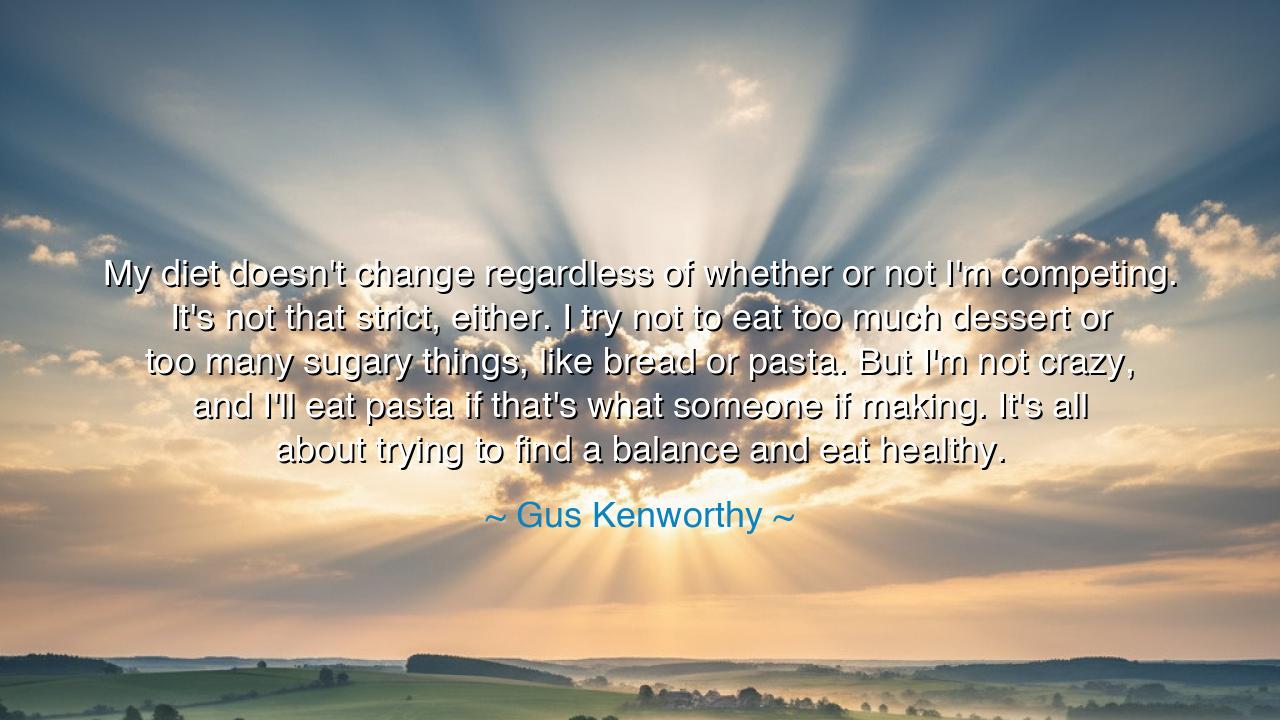
My diet doesn't change regardless of whether or not I'm
My diet doesn't change regardless of whether or not I'm competing. It's not that strict, either. I try not to eat too much dessert or too many sugary things, like bread or pasta. But I'm not crazy, and I'll eat pasta if that's what someone if making. It's all about trying to find a balance and eat healthy.






In the words of Gus Kenworthy, “My diet doesn't change regardless of whether or not I'm competing. It's not that strict, either. I try not to eat too much dessert or too many sugary things, like bread or pasta. But I'm not crazy, and I'll eat pasta if that's what someone is making. It's all about trying to find a balance and eat healthy,” there breathes a wisdom both modern and timeless—the wisdom of balance, the quiet strength that lies between indulgence and restraint. His words speak not merely of food, but of harmony—of the art of living well without falling into the extremes of denial or excess. Like the ancients who sought the middle way, Kenworthy reminds us that mastery does not arise from harsh control, but from steady awareness.
To say “my diet doesn’t change” is to affirm constancy—the noble discipline that endures not through force, but through habit grounded in peace. The athlete who lives in balance does not prepare only for the contest, but for life itself. This is the way of the philosopher and the warrior alike. For the body, like the mind, flourishes not under tyranny, but under thoughtful guidance. Kenworthy’s wisdom lies in his calm moderation: he understands that to live in rhythm with nature, one must not struggle against every craving, nor yield to every desire, but dwell in the still space between.
In the ancient schools of Greece, the philosopher Aristotle spoke of the Golden Mean—the virtue found between two vices. Courage, he said, lies between cowardice and recklessness; generosity between stinginess and waste. So too does health dwell between indulgence and obsession. The man who fears sugar as if it were sin, and the man who devours it without thought, are both enslaved—one to denial, the other to desire. True freedom is found in balance, where the will rules gently and the heart is at ease. Kenworthy’s words are the echo of that ancient truth, wrapped in the humility of a modern athlete.
Think also of Marcus Aurelius, emperor and Stoic, who ruled the mightiest empire and yet lived in simplicity. He dined as the soldiers did, refusing the luxuries of Rome’s banquets. Yet he did not scorn pleasure—he accepted what was placed before him, neither craving nor rejecting. “Accept whatever comes woven in the pattern of your destiny,” he wrote. In the same spirit, Kenworthy says, “I’ll eat pasta if that’s what someone is making.” There is grace in that acceptance, wisdom in that ease. To share a meal in joy is as nourishing as the food itself, for what sustains the body is not only nutrients, but connection.
The balance he speaks of is not mere physical equilibrium—it is spiritual harmony. The one who eats with mindfulness feeds not just the stomach, but the soul. In a world that glorifies extremes—fad diets, strict regimens, endless striving—Kenworthy’s gentleness is rebellion. He reminds us that health is not born from fear, but from friendship with the body. To treat the body harshly is to make an enemy of one’s own being; to honor it with care and understanding is to walk the path of peace.
Even the great athletes of antiquity—the runners of Olympia, the wrestlers of Sparta—knew this truth. They trained not for vanity, but for virtue. Their meals were simple, their hearts disciplined, yet they celebrated the bounty of the earth with gratitude. They knew that to be healthy is to be in rhythm with life itself, and that the measure of greatness is not how much one denies, but how wisely one chooses. So too does Kenworthy’s message stand as a quiet torch in the storm of excess: the light of moderation, glowing with humanity.
Let this be the teaching for all who would hear it: do not live in extremes. Eat with awareness, not anxiety. Strive for health, not perfection. Let discipline serve joy, not smother it. Share your meals with laughter and gratitude, for these too are food for the heart. When you eat, do not count only calories—count the moments of peace you create with each choice. And when you live, remember that balance is not weakness, but wisdom made flesh.
Thus, remember the counsel of Gus Kenworthy: that balance—not denial, not indulgence—is the path to harmony. To live well is not to live rigidly, but to walk the middle way with open eyes and a steady heart. In that place between hunger and fulfillment lies the essence of health—the peace that endures when the feast is over, and the spirit remains nourished.






AAdministratorAdministrator
Welcome, honored guests. Please leave a comment, we will respond soon